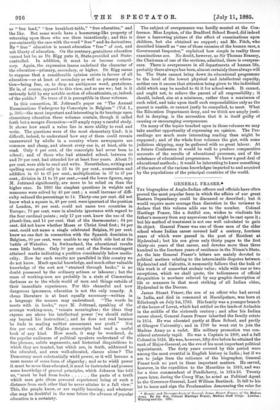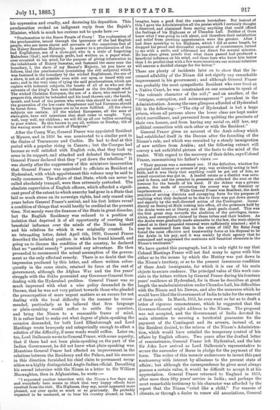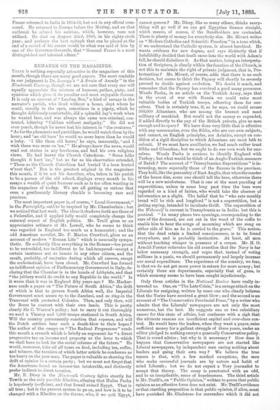GENERAL FRASER.* THE biographies of Anglo-Indian officers and officials have
often proved the most popular form in which the affairs of our great Eastern Dependency could be discussed or described ; but it would require more courage than discretion in the reviewer to declare that this volume adds one to the number. Colonel Hastings Fraser, like a dutiful son, wishes to vindicate his father's memory from any aspersions that might be cast upon it ; but his method of treatment is not one well calculated to gain its object. General Fraser was one of those men of the older school whose Indian career covered half a century, fourteen years of which were passed in the post of Resident at Hyderabad ; but his son gives only thirty pages to the first thirty-six years of that career, and devotes more than three hundred to the fourteen years of residence in the Nizam's State. As the late General Fraser's letters are mainly devoted to political matters relating to the interminable disputes between Hyderabad and Calcutta, it necessarily follows that the bulk of this work is of somewhat archaic value; while with one or two exceptions, which we shall quote, the tediousness of official disquisition is nowhere relieved by any graphic description of life or manners in that most striking of all Indian cities, Hyderabad in the Deccan.
James Stuart Fraser, the son of an officer who had served in India, and died in command at Masulipatam, was born at Edinburgh on July 1st, 1783. His family was a younger branch of the house of Lovat, which had settled on the lands of Ardachie in the middle of the sixteenth century ; and after his Indian career closed, General James Fraser inherited the family estate in 1854. He was educated partly at Ham School, and partly at Glasgow University; and in 1799 he went out to join the Madras Army as a cadet. His military promotion was con- sidered extremely rapid. He was a Captain in 1809, and a full Colonel in 1824. He was, however, fifty-five before he attained the rank of Major-General, on the eve of his most important political appointment. The forty years covered by this period were among the most eventful in English history in India ; but if we are to judge from the reticence of the biographer, General Fraser took no part in these important matters. He served, however, in the expedition to the Mauritius in 1810, and was for a time commandant of Pondicherry, in 1814-16. Twenty years later, during the Coorg War, he acted as Political Agent to the Governor-General, Lord William Bentinck. It fell to his lot to issue and sign the Proclamation denouncing the ruler for
• Memoir and Correspondence of General James Stuart Fraser, of the Madras Army. By his Son, Colonel Hastings Fraser, Madras Staff Corps. London: Whiting and Co. 1885.
his oppression and cruelty, and decreeing his deposition. This proclamation evoked an indignant reply from the Rajah's Minister, which is much too curious not to quote here :—
"Proclamation to the Brave People of Coorg ! The explanation of the proclamation, issued through the ignorance of the bad English people, who are mean slaves and servants of the auspicious feet of the Halery Samsthan Maharaja. In answer to a proclamation of the bad Englishman, son of a slave-girl, who in a state of forgetting idahadena [God], and through pride, had written on a paper what- ever occurred to his mind, for the purpose of giving information to the inhabitants of Halery Samstan, and fastened the same near the boundary, I, the slave of my Master's Majesty, let you know as follows, that the proclamation (containing the evil subjects) which was fastened in the boundary by the wicked Englishman, the son of a slave, is not at all possible even with our eyes, or heard with our ears ; and in the very time of tying the said proclamations, which are replete with indecent subjects, the hearts of all of us who are the servants of the king's feet were inflamed as the fire through wind. The wicked Christian European, the son of a slave, who resolved to prepare this, should be beheaded and his head thrown out; the hands, month, and head of the person who wrote this should be cut off, and the generation of the low.caste blasphemer and bad European should be burnt down. These hopes are to be soon fulfilled. All the above subjects are certain. All the wicked Europeans, all the sons of slave-girls, have evil intentions that shall come to naught. Very well, very well, my children ; we will fill up all our bellies according to your wishes. Be this known to you all, written on Sunday, 6th of the waning moon of the month of Phalguna."
After the Coorg War, General Fraser was appointed Resident at Mysore, and in 1836 he was nominated to a similar post in -the States of Travancore and Cochin. He had to deal at this period with a popular rising in Canara ; but the Coorgas had become so well satisfied with English rule, that they took up arms in its support, and attacked and defeated the insurgents.
general Fraser declared that they "put down the rebellion." It was shortly after the suppression of this miniature insurrection that General Fraser was appointed to officiate as Resident at Hyderabad, with which appointment this volume may be said to really commence. The affairs of that State, which can never be called absolutely tranquil, were then extremely perturbed. The absolute supervision of English officers, which afforded a signifi- cant proof of the extent to which anarchy had gone in a State that
laid so much stress on its sovereign rights, had only ceased nine years before General Fraser's arrival, and his first letters reveal a condition of things that would hardly be credited at the present -time. Not merely were the finances of the State in great disorder,
but the English Residency was reduced to a position of isolation that deprived it of all opportunity of exerting that beneficial influence over the minds of the Nizam himself and his relatives for which it was originally created. In an interesting letter, dated April 6th, 1839, General Fraser described the isolated position in which he found himself, and going on to discuss the condition of the country, he declared that no "partial remedy" promised any advantage. He then proceeded to recommend the actual assumption of the govern- ment as the- only effectual remedy. There is no doubt that the impression produced by this letter, and others written subse- quently in the same strain, retained its force at the seat of government although the Afghan War and the five years' struggle with the Sikhs prevented any Governor-General from dealing with the Hyderabad problem. General Fraser was so much impressed with what a wise policy demanded in the Deccan, that he was not very patient towards those who pleaded the preoccupation of more urgent matters as an excuse for not dealing with the local difficulty in the manner he recom- mended, particularly as he believed that firm language or plain-speaking would suffice to settle the question, and bring the Nizam to a reasonable frame of mind. It is rather hard to make out what degree of plain-speaking the occasion demanded, for both Lord Ellenborough and Lord Hardinge wrote brusquely and categorically enough to effect a solution of the difficulty, if mere words would suffice. Later on, too, Lord Dalhousie wrote to General Fraser, with some asperity, that if there had not been plain-speaking on the part of the Indian Government, he did not know what plain-speaking was. Meantime General Fraser had effected an improvement in the relations between the Residency and the Palace, and his success in this direction furnished his chief claim to permanent recog- nition as a highly distinguished Anglo-Indian official. Describing his second interview with the Nizam in a letter to Sir William Macnaghteu, then in Afghanistan, he wrote :—
"I requested another interview with the Nizam a few days ago, and everybody here seems to think that very happy effects have resulted from the visit. His Highness, they say, never appeared more pleased, nor ever spoke so much or so graciously. He probably expected to be censured, or to hear his country abased, as has, I
imagine, been a good deal the custom heretofore. But instead of this, I gave the Administration all the praise which I certainly thought it deserved, and abstained from saying anything that could offend the feelings of his Highness or of Chandoo Lall. Neither of them knew what I was going to talk about, and therefore their satisfaction and relief from previous apprehension were the greater. Altar I had done speaking to his Highness, which I did at some length, he dropped his proud and distrustful expression of countenance, turned to me with a smile, and addressed me direct for several minutes. He has since given proofs that what there passed had produced a beneficial influence on his mind, and those here who know him better than I do predict that with a few more interviews oar mutual relations will assume a decided change for the better."
There are plenty of incidents later on to show that the in-
creased affability of the Nizara did not signify any remarkable improvement in his government ; and although General Fraser was probably the most sympathetic Resident who ever lived at a Native Court, he was constrained on one occasion to speak of "the volcanic character of the soil ;" and on another, of the "intrigue, corruption, and mismanagement" prevalent in the Administration. Among the rare glimpses afforded of Hyderabad life is the following:—" The city of Hyderabad is but a large prison, where all persons above the lower class are kept under strict surveillance, and prevented from quitting the precincts of their own houses, and from having any social or, still less, any political connection with each other or with the Resident."
General Fraser gives an account of the Arab colony which had established itself in the Deccan after the founding of the Nizam's rule, and which was recruited by a steady immigration of new settlers from Arabia; and the following extract will convey a not unfaithful picture of the facts to the mind of the reader. With regard to the recovery of their debts, says Colonel Fraser, summarising his father's views :—
"Their process was a summary one. If the defaulter, whether for principal and interest or arrears of pay, was evidently acting in bad- faith, and it was likely that anything could be got out of him, an armed execution was put in. A landed estate or a district was owe- pied in force, and the jemadar in possession collected the rent or the revenue for the benefit of his band. If the debtor was a private person, the mode of recovering the money was by distraint or imprisonment While General Fraser was Resident, the Arab practice of seizing districts and occupying forts for the purpose of realising what they declared to be due to them was put down sternly and signally by the well-directed action of the Contingent. Imme- diately on Sooraj-ul-Mulk coming into office, all the prisoners held by the Arabs were set at liberty, and the Arab gaols closed. This was the first great step towards the abolition of the privileges, immu- nities, and exemptions claimed by these tribes and their leaders. As the Arabs were gradually made amenable to the law, the main objects aimed at in their proposed renewal were sufficiently attained ; and it may be mentioned here that in the crisis of 1857 Sir Solar Jung found the most effective and trustworthy force at his disposal to be the Arabs in his pay, and it was mainly by their agency that be restrained and suppressed the mutinous and fanatical elements in the Nizam's territories."
We have quoted this paragraph, but it is only right to say that Colonel Hastings Fraser will not find many to agree with him either as to the means by which the Mutiny was put down in
the Nizam's territory, or as to the present innocuous condition of these Arab immigrants, for which it is one of his main objects to secure credence. The principal value of this work con- sists in the letters written by General Fraser daring his fourteen years' residence at Hyderabad, for in these he describes at great length the maladministration under Chundoo Lall, his difficulties with the Nizam and his Dewan, and also the measures which he would have liked the Government of India to take for the removal of these evils. In March, 1851, he even went so far as to draft a letter of vigorous remonstrance, which he suggested that the Governor-General might address to the Nizam. The proposal was not accepted, and the Government of India devoted its main attention to securing a territorial guarantee for the payment of the Contingent and its arrears, instead of, as the Resident desired, to the reform of the Nizam's Administra- tion, which would have entailed the temporary control of his affairs by English officers. Two years after the drafted letter of remonstrance, General Fraser left Hyderabad, and the late Sir John Low arrived as Lord Dalhousie's representative to secure the surrender of Berar in pledge for the payment of the force. The writer of this memoir endeavours to invest this past controversy with interest by allusions to the present state of affairs; but although the correspondence he gives must always possess a certain value, it would be difficult to accept it at his appreciation. General Fraser returned to England in 1853, after more than fifty years' service in India ; and perhaps the most remarkable testimony to his character was afforded by the report that the Nizam "cried like a child." For reasons of climate, or through a desire to renew old associations, General Fraser returned to India in 1854-55, but not in any official com- mand. He returned to Europe before the Mutiny, and on that outbreak he offered his services, which, however, were not utilised. He died on August 2nd, 1869, in his eighty-sixth year ; and perhaps the best epitaph that can be placed at the end of a record of his career would be what was said of him by one of the Governor-Generals, that" General Fraser is a most distinguished and talented officer."




































 Previous page
Previous page